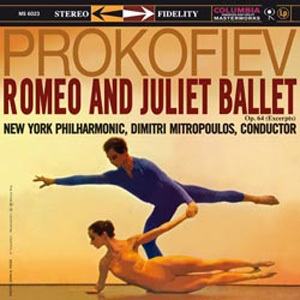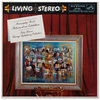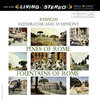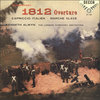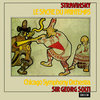Speakers Corner 30 Years pure Analogue
The recording is, quite simply, wonderful. The broad soundstage and natural sense of air, depth and perspective make for fascinating comparisons with contemporary Deccas. The Columbia offers a warmer and less obviously immediate and transparent presentation, but it matches the UK label’s sense of musical coherence, while the sheer substance and solid presence to the sound serve as a constant (and welcome) reminder that this is an American orchestra that you are listening to. There’s some spotlighting of solo instruments, but whether or not you notice that (or simply appreciate the clarity) will depend to a great extent on just how critical your system and speakers are. I was listening via that audio electron microscope known as the Marten Coltrane Supreme 2, and you don’t get much more incisively revealing than that, yet this record and the music it contains were an absolute joy. The "Balcony Scene" and "Death of Tybalt" illustrate both sides of this fabulous performance perfectly, the delicacy and gentle humor in the would-be lovers’ awkwardness a stark contrast with the driven tempi, angular dynamic shifts and strident clashing phrases of the fight scene. Dynamic range is unfettered and instrumental color beautifully captured, helped by the exemplary cut and silent surfaces.
This is one of the nicest reissues I’ve received in quite some time, with every aspect of its execution meeting expectations, from the disc to the labels the sleeve to the choice of material. With so many reissue houses relying on musical bankers, it’s refreshing to see Speakers Corner reissuing material from the roads and back catalogues less traveled. This LP gets my highest recommendation. More, please! TheAudioBeat
Dimitri Mitropoulos was certainly not one of the recording industry’s favorites. His repertoire was far too modern and was judged too risky by record companies since it did not guarantee a commercial success. This was very probably the reason that he was replaced by the charismatic Leonard Bernstein as Principal Conductor of the New York Philharmonic Orchestra. But his audiences loved him all the more, perhaps because they wanted to be challenged when listening to his music-making.
Just how worthwhile such a challenge can be is proved by this recording from his New York period: Prokoviev’s Ballet Suites with their richly orchestrated music are totally effective even when not staged. From the carefree gaiety of a Folk Dance, then to the lyrical sweetness of the Love Theme, right up to the "Death Of Tybalt" with Prokofiev’s hard, grim orchestral vehemence, Mitropoulos gets his New York Philharmonic to pull out all the stops. Not only is the stereophonic sound truly excellent for the technical standard of its day: the superb recording technique and heartfelt artistic dedication have resulted in a recording which possesses all that is needed to underline the legendary greatness of this Greek maestro.
Romeo and Juliet Ballet Op. 64 (Excerpts)
AAA 100% Analogue This Speakers Corner LP was remastered using pure analogue components only, from the master tapes through to the cutting head 25 Years pure Analogue
MADE FROM THE ORIGINAL MASTER TAPES
AAA 100% ANALOGUE - PURE ANALOGUE AUDIOPHILE MASTERING
We use the Original Tapes and work with only the Best Mastering Studios Worldwide
180 GRAM VIRGIN VINYL PLATED & PRESSED AT PALLAS GERMANY
Faithful Reproduction of the Original Artwork and Labels
LIMITED EDITION Released in Limited Quantities
All Licences and Mechanical Rights Paid
Are your records completely analogue?
Yes! This we guarantee!
As a matter of principle, only analogue masters are used, and the necessary cutting delay is also analogue. All our cutting engineers use only Neumann cutting consoles, and these too are analogue. The only exception is where a recording has been made – either partly or entirely – using digital technology, but we do not have such items in our catalogue at the present time
Are your records cut from the original masters?
In our re-releases it is our aim to faithfully reproduce the original intentions of the musicians and recording engineers which, however, could not be realised at the time due to technical limitations. Faithfulness to the original is our top priority, not the interpretation of the original: there is no such thing as a “Speakers Corner Sound”. Naturally, the best results are obtained when the original master is used. Therefore we always try to locate these and use them for cutting. Should this not be possible, – because the original tape is defective or has disappeared, for example – we do accept a first-generation copy. But this remains an absolute exception for us.
Who cuts the records?
In order to obtain the most faithful reproduction of the original, we have the lacquers cut on the spot, by engineers who, on the whole, have been dealing with such tapes for many years. Some are even cut by the very same engineer who cut the original lacquers of the first release. Over the years the following engineers have been and still are working for us: Tony Hawkins, Willem Makkee, Kevin Gray, Maarten de Boer, Scott Hull, and Ray Staff, to name but a few.
At the beginning of the ‘90s, in the early days of audiophile vinyl re-releases, the reissue policy was fairly straightforward. Companies such as DCC Compact Classics, Mobile Fidelity, Classic Records and others, including of course Speakers Corner, all maintained a mutual, unwritten code of ethics: we would manufacture records sourced only from analogue tapes.
Vinyl’s newfound popularity has led many other companies to jump on the bandwagon in the hope of securing a corner of the market. Very often they are not so ethical and use every imaginable source from which to master: CDs, LPs, digital files and even MP3s.
Even some who do use an analogue tape source employ a digital delay line, a misguided ’80s and ‘90s digital technology that replaces the analogue preview head originally used to “tell” the cutter head in advance what was about to happen musically, so it could adjust the groove “pitch” (the distance between the grooves) to make room for wide dynamic swings and large low frequency excursions. Over time analogue preview heads became more rare and thus expensive.
So while the low bit rate (less resolution than a 16 bit CD) digital delay line is less expensive and easier to use than an analogue “preview head”, its use, ironically, results in lacquers cut from the low bit rate digital signal instead of from the analogue source!
Speakers Corner wishes to make clear that it produces lacquers using only original master tapes and an entirely analogue cutting system. New metal stampers used to press records are produced from that lacquer. The only exceptions are when existing metal parts are superior to new ones that might be cut, which includes our release of “Elvis is Back”, which was cut by Stan Ricker or several titles from our Philips Classics series, where were cut in the 1990s using original master tapes by Willem Makkee at the Emil Berliner Studios. In those cases we used only the original “mother” to produce new stampers.
In addition, we admit to having one digital recording in our catalogue: Alan Parsons’ “Eye in the Sky”, which was recorded digitally but mixed to analogue tape that we used to cut lacquers.
In closing, we want to insure our loyal customers that, with but a few exceptions as noted, our releases are “AAA”— analogue tape, an all analogue cutting system, and newly cut lacquers.
60 Years Pallas
Audiophile Vinyl - Made in Germany For over 60 years the family business in the third generation of the special personal service and quality "Made by Pallas" is known worldwide. Our custom PVC formulation produces consistently high pressing quality with the lowest surface noise in the industry. Our PVC complies with 2015 European environmental standards and does not contain toxic materials such as Lead, Cadmium or Toluene. Our vinyl is both audiophile and eco-grade!
